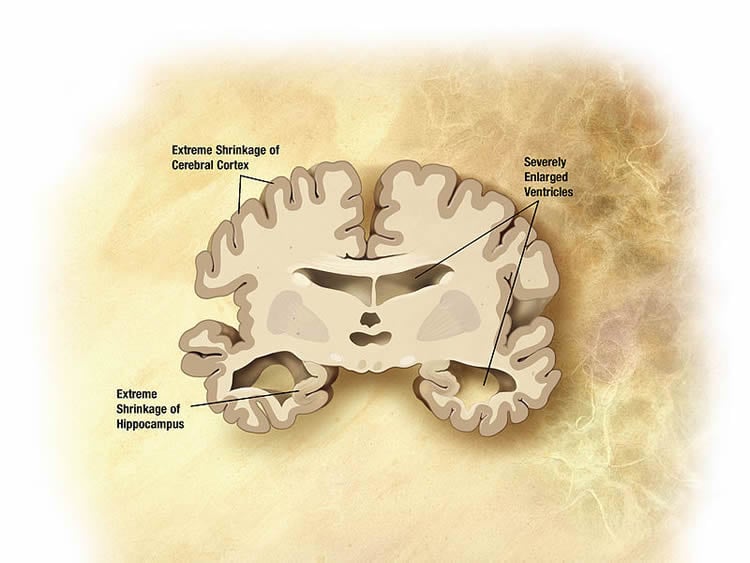Gene defect may point to solution for Alzheimer’s.
Alzheimer’s disease is caused by protein (amyloid) deposition in the brain. New research at the University of Bergen (UiB) and Haukeland University Hospital shows that the protein PITRM1, which is found in mitochondria, otherwise known as the powerhouses of the cell, may be involved in the development of the disease.
“When the level of PITRM1 in the cells decreases, this leads to an increase in the deposition of protein sediment in the brain,” says researcher Janniche Torsvik, at the Mitochondrial Medicine & Neurogenetics (MMN) research group at UiB’s Department of Clinical Medicine (K1).
From gene defect to brain sediment
The group has investigated a family with a gene defect that leads to reduced amounts of PITRM1. The family suffered major physical and psychological problems.
“The family had reduced amounts of this PITRM1 protein and became increasingly ill. Scans of their brains confirmed the damage and when we tested mice with the same loss of PITRM1, these too had neurological problems and protein deposition in the brain,” says Torsvik.
Torsvik points out that the new study is important to understand neurodegenerative diseases such as Alzheimer’s disease.
“The results conclude a long discussion about the relationship between mitochondria and accumulation of amyloid in the brain. We have found that mitochondria play a crucial role in the process of protein deposition,” says Torsvik.
Searching for new medication
Professor Laurence A Bindoff, who is leading the MMN group in Bergen, wants to do more research on PITRM1 and its role in other neurodegenerative diseases.

“Our aim is that this research will help us find medications to prevent or delay diseases like Alzheimer’s,” says Bindoff.
He wants to find out more about diseases such as Alzheimer’s and has applied to become a Norwegian Centre of Excellence (SFF), a programme administered by the Research Council of Norway.
The new centre is to be called the Centre for research into age related neurodegenerative diseases (NeuroAge) and is now in the final round to get the prestigious SFF status.
The UiB researchers worked together with the neurological department at Førde Central Hospital in Norway, the centre Medical Genetics and Molecular Medicine (MGM) at Haukeland University Hospital and the MRC Mitochondrial Biology Unit at the University of Cambridge, a lab led by Massimo Zeviani.
Facts/Mitochondria
- Mitochondria are known as the powerhouses of the cell.
- Mitochondria exist in almost every cell of the human body.
- If the mitochondria do not function the way they should, it can lead to serious illness.
- In mitochondria we find the protein PITRM1. This study show that it is a connection between reduced mitochondrial function and neurodegenerative diseases like Alzheimer`s.
Source: Laurence A. Bindoff – University of Bergen
Image Credit: Image is in the public domain.
Original Research: Full open access research for “Defective PITRM1 mitochondrial peptidase is associated with Aβ amyloidotic neurodegeneration” by Dario Brunetti, Janniche Torsvik, Cristina Dallabona, Pedro Teixeira, Pawel Sztromwasser, Erika Fernandez‐Vizarra, Raffaele Cerutti, Aurelio Reyes, Carmela Preziuso, Giulia D’Amati, Enrico Baruffini, Paola Goffrini, Carlo Viscomi, Ileana Ferrero, Helge Boman, Wenche Telstad, Stefan Johansson, Elzbieta Glaser, Per M Knappskog, Massimo Zeviani, and Laurence A Bindoff in EMBO Molecular Medicine. Published online April 2016 doi:10.15252/emmm.201505894
Abstract
Defective PITRM1 mitochondrial peptidase is associated with Aβ amyloidotic neurodegeneration
Mitochondrial dysfunction and altered proteostasis are central features of neurodegenerative diseases. The pitrilysin metallopeptidase 1 (PITRM1) is a mitochondrial matrix enzyme, which digests oligopeptides, including the mitochondrial targeting sequences that are cleaved from proteins imported across the inner mitochondrial membrane and the mitochondrial fraction of amyloid beta (Aβ). We identified two siblings carrying a homozygous PITRM1 missense mutation (c.548G>A, p.Arg183Gln) associated with an autosomal recessive, slowly progressive syndrome characterised by mental retardation, spinocerebellar ataxia, cognitive decline and psychosis. The pathogenicity of the mutation was tested in vitro, in mutant fibroblasts and skeletal muscle, and in a yeast model. A Pitrm1+/− heterozygous mouse showed progressive ataxia associated with brain degenerative lesions, including accumulation of Aβ‐positive amyloid deposits. Our results show that PITRM1 is responsible for significant Aβ degradation and that impairment of its activity results in Aβ accumulation, thus providing a mechanistic demonstration of the mitochondrial involvement in amyloidotic neurodegeneration.
“Defective PITRM1 mitochondrial peptidase is associated with Aβ amyloidotic neurodegeneration” by Dario Brunetti, Janniche Torsvik, Cristina Dallabona, Pedro Teixeira, Pawel Sztromwasser, Erika Fernandez‐Vizarra, Raffaele Cerutti, Aurelio Reyes, Carmela Preziuso, Giulia D’Amati, Enrico Baruffini, Paola Goffrini, Carlo Viscomi, Ileana Ferrero, Helge Boman, Wenche Telstad, Stefan Johansson, Elzbieta Glaser, Per M Knappskog, Massimo Zeviani, and Laurence A Bindoff in EMBO Molecular Medicine. Published online April 2016 doi:10.15252/emmm.201505894






